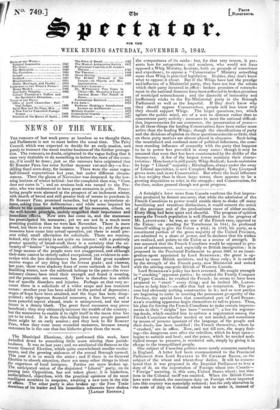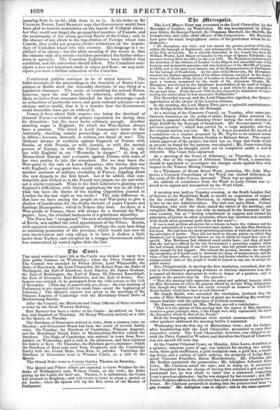A fortnight's later news from Canada confirms the first impres-
sion produced by former accounts, that while the admission of the
French Canadians to power would enable them to shake off many humiliating and vexatious distinctions, it would cement the union of the province and of the predominant races of either section. Every thing had been quiet and cheerful. The progress of opinion among the French population is well illustrated in the progress of Mr. LAFONTAINE : he was, as one of the French race, opposed to the Union : on standing for Terrebonim in 1841, he professed' himself willing to give the Union a trial; in 1842, his party, as a constituent portion of the gross majority of the United Province, are admitted to a share of power, and he declares that his wishes are realized, and points to the Union as a source of strength. It was assumed that the French Canadians would be opposed to pro- jects of advancement, and especially to British immigration : it is proposed in the Provincial Parliament to grant 500/. to an immi- gration-agent appointed by Lord SYDEN RAM; the grant is op- posed by some British members, and by them only ; it is carried by the strength of the French party, now Ministerial and united with the stirring energetic British of Western Canada.
Lord SYDENILLM'S policy has been reversed. He sought strength in " crushing" opponent parties : he crushed the Family Compact
of Upper Canada ; he crushed the French ; he seems to have been
prepared to " crush " every thing ; and he invited Mr. LAFON- TAINE to help him !—an offer that had no temptation. The pro-
cess had obviously nothing constructive in it ; and as now parties are beginning to unite in erecting the permanent prosperity of the Province, the special laws that constituted part of Lord &lies- nest's crushing apparatus begin themselves to fall to pieces. Thus, his plan for forcing the French Canadians to make certain improve- ments in their" sleighs" has been " revised ": a law for register- ing deeds, which enabled him to enforce a registration among the French Canadians whether needed or not needed, and sometimes by means of persons ignorant of the language of the people and their deeds, has been modified : the French themselves, whom he
"crushed," are in office. Now, and not till now' the angry feel- ing—the dangerous sore after the rebellion, which he kept open— begins to subside and heal; and the peace which he needed mul- tiplied troops to preserve is rendered safe, e, simply by giving it in charge to the tranquilized people.
One subject of Canadian politics more nearly concerns ourselves in England. A letter had been communicated to the Provincial Parliament from Lord STANLEY to Sir Cummes BACOT, on the subject of the wheat and wheat-flour duties. It will be remem- bered that it was proposed in the Imperial Parliament to levy a
duty of 3s. on the importation of Foreign wheat into Canada- " Foreign" meaning, in this case, United States wheat ; but that item in the Colonial tariff was omitted. When the British Corn- laws were altered, the maximum duty on Foreign wheat imported into this country was materially reduced; but the only, alteration in the scale of duty on Colonial wheat was to make it, instead of jumping from 5s. to M., slide from 5s. to Is. In his letter to Sir CHARLES BAGOT, Lord STANLEY says that Government would have been glad to remove restrictions on the import of Colonial wheat ; but they could not forget the geographical position of Canada, and the propinquity of the wheat-growing States of the Union ; and, in the absence of any check to the importation of Foreign wheat into Canada, they could not propose further reductions on the import- duty of Canadian wheat into this country. His language is c m- plained of as obsure ; but the plain meaning of the words is, that the absence only of a certain condition prevented the further reduc- tions in question. The Canadian Legislature have fulfilled that condition, and the concession should follow. The Canadians anti- cipate a new and important trade in wheat and flour : we may anti- cipate pro tanto a further relaxation of the Corn-law.



























 Previous page
Previous page